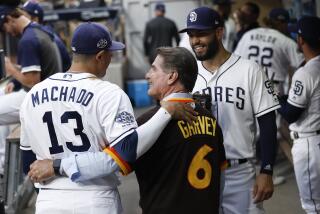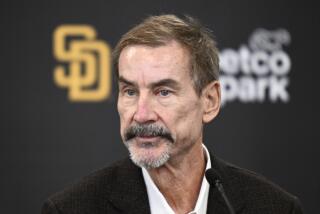Ex-Padre Pitcher Randy Jones Now Selling Windmills
When former San Diego Padre Randy Jones was at the height of his baseball career, a stiff wind was about the only thing that could upset the aim of his accurate but slow-moving sinker.
Today, the wind is Jones’ ally.
Two years after hanging up his baseball glove and spikes, Jones is busy selling windmills for a Northern California firm.
Calling himself an “investment marketer,” Jones also is dabbling in real estate with a $1.1-million commercial, office and restaurant project near Chico.
The curly mopped former pitcher once referred to by Padre broadcaster Jerry Coleman as “the little left-hander with the Karl Marx hairdo” seems to be making a smooth transition from big league baseball to big league business.
But then, the winner of the 1976 Cy Young Award as the National League’s best pitcher has never been a stranger to the business world. Jones, a business graduate of Orange County’s Chapman College, took some of the $400,000 a year that the Padres paid him in the late 1970s and invested it in a chain of car washes in San Diego’s North County.
He has since sold the car washes and now is president of RJP & Associates, a firm he founded in 1983 with Paul Deese, his former Chapman College baseball coach.
In an interview in his San Diego office, Jones, a Poway resident, reminisced about his playing days and sounded optimistic that he will find the same success off the field.
This time, however, he hopes his fortune will be less fleeting.
Traded from the Padres to the New York Mets in 1980, Jones, his left arm wilted from a string of injuries, clung to his career for two more years before he was finally let go by the Pittsburgh Pirates in the spring of 1983. Nevertheless, he will be paid through 1986 under his contract with the Mets.
“That gave me the opportunity not to rush myself into business,” Jones said of his contract. After leaving baseball, the Brea, Calif., native spent six months on golf courses pondering his future. Then in August, 1983, he founded the investment company with Deese.
About the same time, Jones bought a $120,000 windmill as a personal investment from Fayette Manufacturing Corp. of Tracy, one of the nation’s top producers of wind energy equipment. Several weeks later, Fayette President John E. Eckland asked Jones to sell the wind turbines in Southern California.
Eckland says he had a gut feeling that Jones would do well in business. That hunch was soon borne out. RJP & Associates has become Fayette’s No. 1 marketer, selling about 300 windmills since late 1983 and bringing Fayette more than $30 million in revenues last year.
“He’s so personable that it’s hard not to like him immediately,” Eckland said. Indeed, Jones, drawing on a Marlboro cigarette and scuffing the floor with his ostrich-skin boots, has a sort of “good ol’ boy” air.
“Every day brings a new opportunity,” he says, flipping through a pile of phone messages.
Although he doesn’t like to call the windmills “tax shelters,” Jones acknowledges that sales of the turbines, which bring investors a 25% credit on state and federal income taxes, could suffer under the Reagan Administration’s modified flat-tax proposal.
So Jones is looking to diversify, starting with the renovation of a 64-year-old school in Durham, a small town north of Sacramento. RJP is converting three buildings into restaurants, offices, shops and a market. The Pratt School Marketplace is due to open this month.
“Butte County kind of reminds me of Poway when I first moved there,” Jones said. “I saw the development of Poway over the years. This place has a bright future too.”
Jones said he plans eventually to offer his investments to ballplayers and their agents, but that he is reluctant to do so now.
He said he remembers his days as a player, when recent retirees were an embarrassment, peddling their products in the locker room.
“A guy retires, and he tries to go back to the clubhouse and sell insurance to every guy on the club. He comes in, and they look up and say, ‘What’s he selling now?’ I don’t want to be like that.”
First he would like to build a reputation as an astute businessman, Jones said.
“Winning the Cy Young Award and playing 10 years of professional baseball doesn’t give you a track record in business,” he said. “I’ve got to get out in the marketplace and prove I know what I’m doing.”
Still, Jones concedes that the contacts he made in baseball can be helpful.
“Being an ex-ballplayer, there are people I know,” he said. “It creates an opportunity to market, but I also want my friends to believe my product is credible.”
Of more help, Jones said, is the competitive attitude he developed as a player.
“All the hours of mental work and physical work I put into being a good pitcher helped prepare me for business,” he said. “I feel that when I work just as hard out here, it pays dividends. I used to walk onto the mound and pitch every fourth day. Now I walk onto the mound every day.”
More to Read
Go beyond the scoreboard
Get the latest on L.A.'s teams in the daily Sports Report newsletter.
You may occasionally receive promotional content from the Los Angeles Times.










